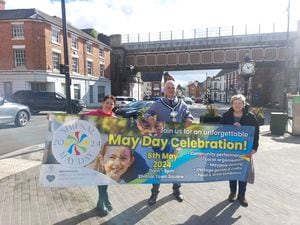No religion? Catholic Bishop of Shrewsbury speaks of 'heart chilling' vision of Lennon's Imagine
The Roman Catholic Bishop of Shrewsbury has described as "heart-chilling" John Lennon's vision of a world without religion.

The Right Reverend Mark Davies said the sentiments of Lennon's 1971 song Imagine – that peace could only come about without religion – were "ill-founded".
"In reality, it is human sin which lies at the root cause of war," writes Bishop Davies in his Christmas address. "Conflicts, writes St James, arise within the human heart wherever 'bitter jealousy and selfish ambition' are found."
Bishop Davies considered the 1914 Christmas truce that saw British and German soldiers lay down their guns.
"The events of Christmas 1914 give the lie to the lazily repeated assertion that 'religion is the cause of wars'. John Lennon would give voice to this ill-founded belief in the lyrics of his song Imagine. This becomes a heart-chilling vision in which Lennon imagines a world with no hope of heaven and no fear of hell. And he adds, 'no religion too'. Only then, he suggests will 'all the people' be 'living life in peace'.
"The fact is, the wars of the century past, bringing atrocities and destruction on a scale never seen before, were largely inspired by secularist and openly anti-Christian ideologies."
Bishop Mark Davies's Christmas message:
In the darkness of this night Christians gather across the world to welcome "news of great joy" of the Child born for us (Is 9:6), the Saviour given to us, who is Christ the Lord (Lk. 2:10).
And on this night, we cannot fail to recall how exactly 100 years ago soldiers emerged from the trenches of the Western Front to sing of Christ's birth; to join hands in friendship; to exchange gifts and even to play improvised games of football. The Christmas truce of 1914 is universally recognised as a brief moment of humanity amidst the death and destruction of the Great War.
The events of Christmas 1914 give the lie to the lazily repeated assertion that "religion is the cause of wars." John Lennon would give voice to this ill-founded belief in the lyrics of his song Imagine. This becomes a heart-chilling vision in which Lennon imagines a world with no hope of heaven and no fear of hell. And he adds, "no religion too." Only then, he suggests will "all the people" be "living life in peace".
The fact is, the wars of the century past, bringing with them atrocities and destruction on a scale never seen before, were largely inspired by secularist and, indeed, openly anti-Christian ideologies. In reality, it is human sin which lies at the root cause of war. Conflicts, writes St James, arise within the human heart wherever "bitter jealousy and selfish ambition" are found (James 3: 14).
Tonight we declare that Christ came to "save us from our sins," to enable us to give glory to God and to bring peace amongst men.
Christ calls all who would follow Him to have, as we have just heard in St Paul's words: "no ambition except to do good" (Titus 2:14).
In Britain today we are told two thirds of schools now substitute a "winter celebration" for the Nativity Story; civil servants, it is reported, are advised not to use the word "Christmas" to avoid giving offence; and most civic authorities limit themselves to voicing merely "Seasonal Greetings."
How much we need to be reminded on this Christmas Night 2014, that the greatest message for peace and the cohesion of society is being lost amongst us!
Charles Dickens captured this message in his A Christmas Carol "Christmas," Scrooge's nephew tells him, "is the only time I know of, in the long calendar year, when men and women seem by one consent to open their shut-up hearts freely."
If the light and meaning of Christmas were to be lost, then what would call new generations to so open their hearts? What would call them beyond divisions to recognise each other as sisters and brothers, each with an eternal value and dignity? This was "the news of great joy" meant for all people which was first heard in the hills of Bethlehem 2,000 years ago and even echoed amid the trenches of the Great War. It is the joy welcomed anew in our hearts this night: "a saviour has been born to you; he is Christ the Lord" (Lk 2: 11).





